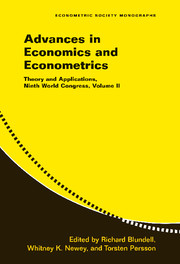Book contents
- Frontmatter
- Contents
- Contributors
- Introduction by the Editors
- Advances in Economics and Econometrics
- 1 Empirical Models of Auctions
- 2 Identification in Models of Oligopoly Entry
- 3 Empirical Models of Imperfect Competition: A Discussion
- 4 Recent Developments in the Economics of Price Discrimination
- 5 Bounded Rationality in Industrial Organization
- 6 Price Discrimination and Irrational Consumers: Discussion of Armstrong and Ellison
- 7 Behavioral Economics
- 8 Incentives and Self-Control
- 9 Discussion of “Behavioral Economics”
- 10 Dynamic Models for Policy Evaluation
- 11 Microeconometric Search-Matching Models and Matched Employer-Employee Data
- 12 Discussion of ‘Dynamic Models for Policy Evaluation’ and ‘Microeconometric Search-Matching Models and Matched Employer-Employee Data’
- 13 Field Experiments in Development Economics
- 14 Institutions and Development: A View from Below
- Index
- Titles in the series
14 - Institutions and Development: A View from Below
Published online by Cambridge University Press: 05 January 2013
- Frontmatter
- Contents
- Contributors
- Introduction by the Editors
- Advances in Economics and Econometrics
- 1 Empirical Models of Auctions
- 2 Identification in Models of Oligopoly Entry
- 3 Empirical Models of Imperfect Competition: A Discussion
- 4 Recent Developments in the Economics of Price Discrimination
- 5 Bounded Rationality in Industrial Organization
- 6 Price Discrimination and Irrational Consumers: Discussion of Armstrong and Ellison
- 7 Behavioral Economics
- 8 Incentives and Self-Control
- 9 Discussion of “Behavioral Economics”
- 10 Dynamic Models for Policy Evaluation
- 11 Microeconometric Search-Matching Models and Matched Employer-Employee Data
- 12 Discussion of ‘Dynamic Models for Policy Evaluation’ and ‘Microeconometric Search-Matching Models and Matched Employer-Employee Data’
- 13 Field Experiments in Development Economics
- 14 Institutions and Development: A View from Below
- Index
- Titles in the series
Summary
Abstract
In this paper we argue for greater exploitation of synergies between research on specific institutions based on micro-data and the big questions posed by the institutions and growth literature. To date, the macroeconomic literature on institutions and growth has largely relied on cross-country regression evidence. This has provided compelling evidence for a causal link between a cluster of ‘good’ institutions and more rapid long run growth. However, an inability to disentangle the effects of specific institutional channels on growth or to understand the impact of institutional change on growth will limit further progress using a cross-country empirical strategy. We suggest two research programs based on micro-data that have significant potential. The first uses policy-induced variation in specific institutions within countries to understand how these institutions influence economic activity. The second exploits the fact that the incentives provided by a given institutional context often vary with individuals' economic and political status. Variations in how individuals respond to the same institution can be used to both identify how institutions affect economic outcomes and to understand how institutional change arises in response to changing economic and demographic pressures.
INTRODUCTION
Recent years have seen a remarkable and exciting revival of interest in the empirical analysis of how a broad set of institutions affects growth. The focus of the recent outpouring of research is on exploiting cross-country variation in ‘institutional quality’ to identify whether a causal effect runs from institutions to growth.
- Type
- Chapter
- Information
- Advances in Economics and EconometricsTheory and Applications, Ninth World Congress, pp. 349 - 412Publisher: Cambridge University PressPrint publication year: 2006
- 31
- Cited by

